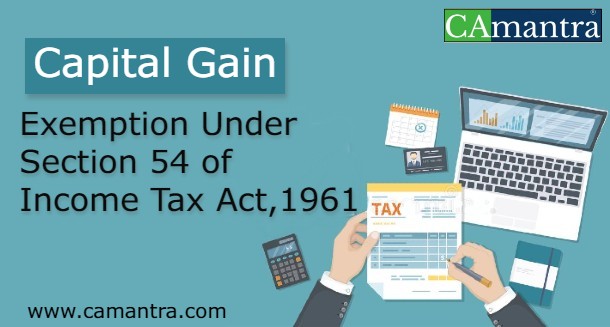The Income Tax Act- section 54 endows exemption for ‘Long Term Capital Gain’ arising on sale of residential property.
Let’s understand the basis of ‘Capital Assets’ & ‘Capital Gain’
The term ‘capital asset’ is defined under the Income Tax Act, 1961- section 2 (14) which includes any kind of property (movable or immovable property, tangible or intangible property etc.) held by an assessee. These kind of properties may be connected with the business or profession or may not be connected with the business of the assessee.
Based on the holding period of the ‘capital asset’, the capital asset is divided into two which are:-
- Long Term Capital Asset or
- Short Term Capital Asset
Likewise, the gain arising on the capital assets sale are termed as
- Long Term Capital Gain or
- Short Term Capital Gain.
Who Can Target Claiming The Advantage Of Exemption Under Section 54 Of Income Tax Act?
Only the individual or Hindu Undivided Family who has sold residential property and bought another residential property can take the benefit of exemption under section 54 the Income Tax Act provided all the required conditions are satisfied.
What Are The Conditions For Availing The Exemption Under Section 54?
These are the list of conditions which are essentially to be satisfied in order to claim an exemption under section 54 –
- The benefit of exemption under section 54 is accessible only to an individual or a Hindu Undivided Family (HUF).
- The capital asset transferred need to be a ‘Residential House Property’. Further, income from this kind of residential house property should be chargeable under the head ‘Income from House Property’.
- The capital asset transferred need to be a ‘Long term capital asset’.
- The seller of ‘Residential House Property’ need to have either –
- Purchased one residential house in India within a period of 01 year before or 2 years after the date of transfer; or
- Constructed one residential house in India within a period of 3 years from the date of transfer.
According to the recent amendment, the benefit of exemption under section 54 is also available in case of re-purchase or construction of two residential house property only and only if ‘Long Term Capital Gain’ amount does not exceed Rs. 2 Crores.
What Are The Amount Of Exemption Available Under Section 54 Of The Income Tax Act:-
In case all the conditions described under section 54 are satisfied, the amount of exemption available would be lower of the following –
- Investment furnished towards purchase or construction of the residential house property; or
- Long term capital gain arising on the residential house property transfer.
Capital Gains Deposit Account Scheme –
When the capital gain arising on transfer of the residential house is not utilized for purchase or construction of a new house till the date of return filing, then, for claiming the exemption, the unutilized amount should be transferred to ‘Capital Gains Deposit Account Scheme’.
The new residential house can be purchased or constructed by utilizing the amount deposited in the ‘Capital Gain Deposit Account Scheme’ within the prescribed time. However, in case the deposited amount is not utilized within the prescribed time, then, the unutilized amount will be treated as income of the previous year in which the period of two year /three years expires.
How Can An Individual Claim Exemption Under Section 54?
The exemption under section 54 can be claimed in case of long term capital gain arising on sale of residential house property. In order to claim the exemption, the assessee is required to re-invest the amount towards purchasing or constructing new residential house property.
Can An Individual Take Advantage Of Section 54 And 54F Simultaneously?
Benefit under both section 54 and section 54F is not available at the same time. The assessee can either take exemption advantage under section 54 or under section 54F.

